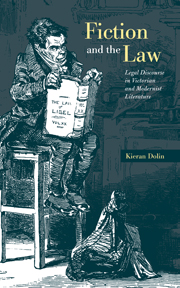Book contents
- Frontmatter
- Contents
- Acknowledgments
- 1 Narrative forms and normative worlds
- 2 The modern Western nomos
- 3 True testimony and the foundation of nomos – The Heart of Midlothian
- 4 Reformist critique in the mid-Victorian “legal novel” – Bleak House
- 5 Representation, inheritance and anti-reformism in the “legal novel” – Orley Farm
- 6 Power, chance and the rule of law – Billy Budd, Sailor
- 7 From sympathetic criminal to imperial law-giver – Lord Jim
- 8 Freedom, uncertainty and diversity – the critique of imperialist law in A Passage to India
- 9 Settling out of court
- Notes
- Index
8 - Freedom, uncertainty and diversity – the critique of imperialist law in A Passage to India
Published online by Cambridge University Press: 18 December 2009
- Frontmatter
- Contents
- Acknowledgments
- 1 Narrative forms and normative worlds
- 2 The modern Western nomos
- 3 True testimony and the foundation of nomos – The Heart of Midlothian
- 4 Reformist critique in the mid-Victorian “legal novel” – Bleak House
- 5 Representation, inheritance and anti-reformism in the “legal novel” – Orley Farm
- 6 Power, chance and the rule of law – Billy Budd, Sailor
- 7 From sympathetic criminal to imperial law-giver – Lord Jim
- 8 Freedom, uncertainty and diversity – the critique of imperialist law in A Passage to India
- 9 Settling out of court
- Notes
- Index
Summary
English law and English literature were closely, yet variously connected during Britain's imperial domination of India. Anglo-Indians – the English who lived and worked in India – have been enrolled in the “configuration of law and letters” traced throughout this study: the first English judge at Calcutta was the poet and Oriental linguist, Sir William Jones; the nineteenth-century administrator, Sir Alfred Lyall, was a poet and critic. Both men were admired by E. M. Forster, not only for their literary avocations, but for their interest in Indian culture, a rare combination in Anglo-India:
after two hundred years of political connexion with India, we in England know next to nothing about the Indian cultures … We have sent our soldiers and administrators … but few scholars and fewer artists … It is unwise to suppose that culture is unimportant … What attempt has been made by our rulers to promote Oriental scholarship and to carry on the tradition of Sir William Jones?
Forster's question challenges a century-old policy of “Anglicization” that was most forcefully expounded by another literary lawyer, Thomas Babington Macaulay, in his “Minute on Indian Education.” Macaulay's assertion of “the intrinsic superiority of … Western literature” under lay an Anglocentric education policy that, by producing “a class of persons, Indian in blood and colour, but English in taste, in opinions, in morals and in intellect, ” would ensure cultural domination.
- Type
- Chapter
- Information
- Fiction and the LawLegal Discourse in Victorian and Modernist Literature, pp. 169 - 192Publisher: Cambridge University PressPrint publication year: 1999



